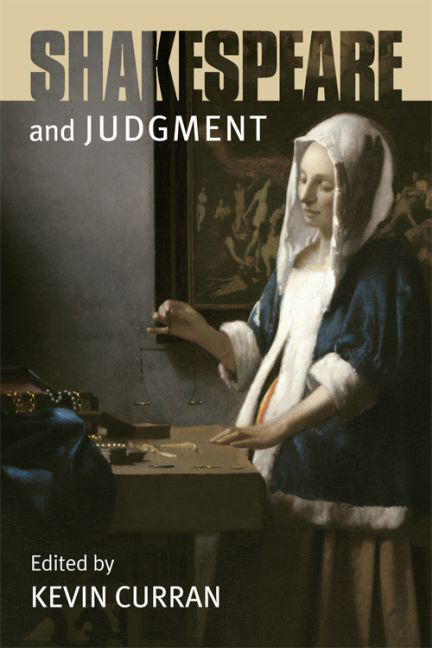Book contents
- Frontmatter
- Contents
- Acknowledgments
- List of Contributors
- Introduction
- Part I Staging Judgment: Deliberation in the Plays
- Part II Audience Judgment: Deliberation in the Theater
- Part III The Ethics of Judgment
- 8 Antinomian Shakespeare: English Drama and Confession Across the Reformation Divide
- 9 Bracketed Judgment, “Un-humanizing,” and Conversion in The Merchant of Venice
- 10 The Judgment of the Critics that Makes us Tremble: “Distributing Complicities” in Recent Criticism of King Lear
- Index
9 - Bracketed Judgment, “Un-humanizing,” and Conversion in The Merchant of Venice
from Part III - The Ethics of Judgment
Published online by Cambridge University Press: 10 May 2017
- Frontmatter
- Contents
- Acknowledgments
- List of Contributors
- Introduction
- Part I Staging Judgment: Deliberation in the Plays
- Part II Audience Judgment: Deliberation in the Theater
- Part III The Ethics of Judgment
- 8 Antinomian Shakespeare: English Drama and Confession Across the Reformation Divide
- 9 Bracketed Judgment, “Un-humanizing,” and Conversion in The Merchant of Venice
- 10 The Judgment of the Critics that Makes us Tremble: “Distributing Complicities” in Recent Criticism of King Lear
- Index
Summary
In sooth I know not why I am so sad.
It wearies me, you say it wearies you;
But how I caught it, found it, or came by it,
What stuff ‘tis made of, whereof it is born,
I am to learn.
I propose that the famously unexplained mood of emotional helplessness with which Antonio thus opens The Merchant of Venice is the first of many prompts for an efficacious counter-mode of self-reflection that is deeply embedded in the play's language. This is a modality of language in symbolic action that is linked, in reaction, to the morally problematical manifestations of the surface drama. Many commentators have noted the degraded values for which the play's apparent heroes stand, especially the way their claims for Christian mercy are belied by merciless legalism and unabashed greed. I believe that a reactive reflection on the surface drama is an inner necessity generated by the play itself. Yet the widely divergent responses that constitute the history of reception of The Merchant of Venice turn precisely on whether one recognizes that inner necessity. A. D. Nuttall puts his finger directly on this question – “the most difficult point,” he calls it – and decides against the recognition. His reasoning, and what I believe are its flaws, are telling:
Half-buried echoes and subauditions in the play really do compose a structure, and an exciting subversive thesis. But they are not the play. After years of pious criticism the views of A. D. Moody and H. C. Goddard are very seductive. Moody says, “Shylock avows the moral sense by which they actually live. We can see that by condemning Shylock they are condemning their own sins. It would seem that they are making him literally into their scapegoat … or, A. C. Goddard puts it, ‘They project onto him what they have dismissed from their own consciousness as too disturbing.’” But in agreeing with this we are in danger of forgetting the real generosity, however produced, of the Christians, the real ferocity, however explained, of Shylock. They did forgive Shylock. Shylock would have torn open the breast of Antonio. These are things which no theatrical experience of the play will ever let you forget. … The subversive counter-thesis is itself too easy.
- Type
- Chapter
- Information
- Shakespeare and Judgment , pp. 195 - 214Publisher: Edinburgh University PressPrint publication year: 2017



